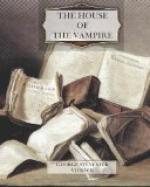The cause of the rupture between them was a matter only of surmise; but the effect it had on the woman testified clearly to the remarkable power of Reginald Clarke. He had entered her life and, behold! the world was transfixed on her canvases in myriad hues of transcending radiance; he had passed from it, and with him vanished the brilliancy of her colouring, as at sunset the borrowed amber and gold fade from the face of the clouds.
The glamour of Clarke’s name may have partly explained the secret of his charm, but, even in circles where literary fame is no passport, he could, if he chose, exercise an almost terrible fascination. Subtle and profound, he had ransacked the coffers of mediaeval dialecticians and plundered the arsenals of the Sophists. Many years later, when the vultures of misfortune had swooped down upon him, and his name was no longer mentioned without a sneer, he was still remembered in New York drawing-rooms as the man who had brought to perfection the art of talking. Even to dine with him was a liberal education.
Clarke’s marvellous conversational power was equalled only by his marvellous style. Ernest Fielding’s heart leaped in him at the thought that henceforth he would be privileged to live under one roof with the only writer of his generation who could lend to the English language the rich strength and rugged music of the Elizabethans.
Reginald Clarke was a master of many instruments. Milton’s mighty organ was no less obedient to his touch than the little lute of the troubadour. He was never the same; that was his strength. Clarke’s style possessed at once the chiselled chasteness of a Greek marble column and the elaborate deviltry of the late Renaissance. At times his winged words seemed to flutter down the page frantically like Baroque angels; at other times nothing could have more adequately described his manner than the timeless calm of the gaunt pyramids.
The two men had reached the street. Reginald wrapped his long spring coat round him.
“I shall expect you to-morrow at four,” he said.
The tone of his voice was deep and melodious, suggesting hidden depths and cadences.
“I shall be punctual.”
The younger man’s voice trembled as he spoke.
“I look forward to your coming with much pleasure. I am interested in you.”
The glad blood mounted to Ernest’s cheeks at praise from the austere lips of this arbiter of literary elegance.
An almost imperceptible smile crept over the other man’s features.
“I am proud that my work interests you,” was all the boy could say.
“I think it is quite amazing, but at present,” here Clarke drew out a watch set with jewels, “I am afraid I must bid you good-bye.”
He held Ernest’s hand for a moment in a firm genial grasp, then turned away briskly, while the boy remained standing open-mouthed. The crowd jostling against him carried him almost off his feet, but his eyes followed far into the night the masterful figure of Reginald Clarke, toward whom he felt himself drawn with every fiber of his body and the warm enthusiasm of his generous youth.




